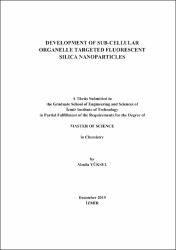Please use this identifier to cite or link to this item:
https://hdl.handle.net/11147/9660Full metadata record
| DC Field | Value | Language |
|---|---|---|
| dc.contributor.advisor | Özçelik, Serdar | - |
| dc.contributor.author | Yüksel, Almila | - |
| dc.date.accessioned | 2020-10-06T07:39:17Z | |
| dc.date.available | 2020-10-06T07:39:17Z | |
| dc.date.issued | 2019-12 | - |
| dc.identifier.citation | Yüksel, A. (2019). Development of sub-cellular organelle targeted fluorescent silica nanoparticles. Unpublished master's thesis, İzmir Institute of Technology, İzmir, Turkey | en_US |
| dc.identifier.uri | https://hdl.handle.net/11147/9660 | - |
| dc.description | Thesis (Master)--Izmir Institute of Technology, Chemistry, Izmir, 2019 | en_US |
| dc.description | Includes bibliographical references (leaves: 54-60) | en_US |
| dc.description | Text in English; Abstract: Turkish and English | en_US |
| dc.description.abstract | Silica nanoparticles have been studied extensively in cellular applications due to their physicochemical properties. The surface of silica nanoparticles represent the key parameter in biological studies. Owing to their versatile surface chemistry, have ability to increase bioavailability and selectivity. Therefore, it is significant to understand how biomolecules interact with the surface of silica nanoparticles. The study reviews how synthesized both negative and positive potential silica nanoparticles and can transfer their properties to the cells. In the second part, our synthesized silica nanoparticles were characterized physicochemically using some instrumental devices. To answer the role of silica nanoparticles in the cells, some outcomes such as viability test, image analysis, colocalization analysis and mitochondrial membrane potential were investigated. A549 (adenocarcinomic human alveolar basal epithelial cells) and BEAS-2B (human bronchial epithelial cells) cell lines were selected in our studies. Our results showed the cytotoxicity was dose and time dependent in direct proportion. Mitochondrial accumulation were observed in cells treated with the silica nanoparticles according to Pearson’s Coefficient Correlation and Image J analysis. The study concluded that the silica nanoparticles can be used in the field of targeted delivery and bioimaging in cellular studies. | en_US |
| dc.description.abstract | Nanotanecikler fizikokimyasal özellikleri sebebiyle hücresel çalışmalarda çok tercih edilmektedir. Silika nanotaneciklerin yüzey kimyası değiştirilerek biyolojik çalışmalarda uygulanabilir hale getirilebilir. Çok yönlü yüzey kimya platformuna sahip olmaları nedeniyle, biyoyararlanımı ve seçiciliği arttırma yeteneğine sahiptir. Bu nedenle, biyomoleküllerin silika nanoparçacıkların yüzeyi ile nasıl etkileşime girdiğini anlamak önemlidir. Bu çalışma hem negatif yüklü hem de pozitif yüklü silica nanoparçacıkların nasıl sentezlendiğini ve özelliklerini hücrelere nasıl aktardıklarını inceler. İkinci kısımda, sentezlenen iki farklı silika nanotaneciğin karakterizasyonu enstrümental analiz cihazlar yardımıyla tayin edilmiştir. Silica nanotaneciklerin hücredeki davranışını öğrenmek için canlılık testi, görüntü analizi, kolokalizasyon analizi ve mitokondri potansiyel ölçümü gibi deneyler yapılmıştır. Bu amaçla çalışmalarımızda A549 ve BEAS-2B hücre hatları seçilmiştir. Çalışmalarımız göstermektedir ki, sentezlenilen silika nanotanecikler doz ve zamana doğrudan bağlı olarak sitotoksisiteye etki etmektedir. Pearson Korelasyon Katsayısı ve Image J analiz sonuçlarına göre, sentezlenilen silika nanotaneciklerin hücrede mitokondri içerisinde biriktiği gözlemlenmiştir. Sonuç olarak, silica nanotaneciklerin hedefe yönelik taşıyıcı uygulamalarda veya biyogörüntülemede kullanılmaları beklenmektedir. | en_US |
| dc.format.extent | xi, 60 leaves | - |
| dc.language.iso | en | en_US |
| dc.publisher | Izmir Institute of Technology | en_US |
| dc.rights | info:eu-repo/semantics/openAccess | en_US |
| dc.subject | Silica nanoparticles | en_US |
| dc.subject | Cytotoxicity | en_US |
| dc.subject | Cell lines | en_US |
| dc.title | Development of Sub-Cellular Organelle Targeted Fluorescent Silica Nanoparticles | en_US |
| dc.title.alternative | Hücre-altı Organel Hedefli Floresan Silika Nanotaneciklerin Geliştirilmesi | en_US |
| dc.type | Master Thesis | en_US |
| dc.institutionauthor | Yüksel, Almila | - |
| dc.department | Thesis (Master)--İzmir Institute of Technology, Chemistry | en_US |
| dc.relation.publicationcategory | Tez | en_US |
| dc.identifier.wosquality | N/A | - |
| dc.identifier.scopusquality | N/A | - |
| item.grantfulltext | open | - |
| item.openairetype | Master Thesis | - |
| item.openairecristype | http://purl.org/coar/resource_type/c_18cf | - |
| item.fulltext | With Fulltext | - |
| item.languageiso639-1 | en | - |
| item.cerifentitytype | Publications | - |
| Appears in Collections: | Master Degree / Yüksek Lisans Tezleri | |
Files in This Item:
| File | Description | Size | Format | |
|---|---|---|---|---|
| 10324301.pdf | MasterThesis | 4.85 MB | Adobe PDF |  View/Open |
CORE Recommender
Page view(s)
406
checked on Jun 16, 2025
Download(s)
240
checked on Jun 16, 2025
Google ScholarTM
Check
Items in GCRIS Repository are protected by copyright, with all rights reserved, unless otherwise indicated.